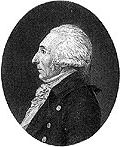 |
Pierre-Roger Ducos, dit Roger-Ducos
b. 25 Jul 1747, Dax, Landes [1]
d. 17 Mar 1816, Ulm, Kingdom of Württemberg |
| Title: |
Membre du Directoire exécutif de la République française (Member of the Executive Directory of the French Republic) |
| Term: |
1 Jul 1799 - 10 Nov 1799 |
| Chronology: |
18 Jun 1799, ten candidates for election of a member of the Directoire exécutif (Executive Directory) nominated by the Conseil des Cinq-Cents (Council of Five Hundred) and the list passed to the Conseil des Anciens (Council of Ancients) [2][3] |
|
19 Jun 1799, elected, session of the Council of Ancients, salle des Machines, Palais des Tuileries, Paris [4][5] |
|
1 Jul 1799, assumed the functions of office, session of the Executive Directory, Palais du Luxembourg, Paris [6] |
|
10 Nov 1799, Executive Directory recognized as not existing, Law of 19 brumaire, Year VIII, passed by the Council of Ancients, galerie d'Apollon (grande galerie), Palais de Saint-Cloud, Saint-Cloud [7] |
| Names/titles: |
Baptised (25 Jul 1747): Roger Ducos [8] |
|
Comte Ducos, comte de l'Empire (count Ducos, count of the Empire) [from 28 May 1808] |
|
Consul de la République française (Consul of the French Republic) (10 Nov 1799 - 25 Dec 1799) [see details] |
| Biography: |
| Practised law at Dax; served as president of the Criminal Tribunal of Landes (1791-1792); elected to the Convention nationale (National Convention) (1792-1795) as a representative of the département of Landes; voted for the death sentence to King Louis XVI; supported the expulsion of the Girondins; elected president of the Society of Jacobins (1794); elected to the Corps législatif (15 Oct 1795); selected to sit in the Conseil des Anciens (Council of Ancients) (1795-1798); served as President of the Council of Ancients (23 Sep 1796 - 22 Oct 1796); in absence of the incumbent, presided at the famous meeting of the Council of Ancients on 18 Fructidor (4 Sep 1797); approved all measures against royalists; acquiesced to the annulation of his election to the Corps législatif according to the law of 22 Floréal, Year VI (11 May 1798), voiding the election of 106 left-wing deputies (coup of 22 Floréal); returned to exercising the functions of president of the Criminal Tribunal of Landes; elected (19 Jun 1799) to the Directoire exécutif (Executive Directory) to replace Philippe-Antoine Merlin de Douai; supported the coup d'état of 18 Brumaire, Year VIII (9 Nov 1799 - 10 Nov 1799); nominated one of the three Consuls of the Republic (10 Nov 1799 - 25 Dec 1799); nominated member of the Sénat conservateur (ex officio as the outgoing consul according to Art. 24, Constitution of Year VIII, effective 25 Dec 1799); created a member (2 Oct 1803) and grand officer (14 Jun 1804) of the Legion of Honor; named a peer of France (2 Jun 1815) during the Cent-Jours (Hundred Days); proscribed as a regicide and was forced to leave France (1816); suffered injuries in a road accident
near Ulm, Württemberg, and went into a coma; was taken to
Ulm, where died (17 Mar 1816).
|
| Biographical sources: "Le troisième consul Roger Ducos", by Michel Massie (Biarritz: J & D Éditions, 1992) |
| Elections: |
| Candidate |
Vote (19 Jun 1799) |
| Pierre-Roger Ducos, dit Roger-Ducos |
153 |
| Armand-Samuel (de) Marescot |
43 |
| Charles Delacroix de Contaut |
3 |
| Pierre-François-Joseph Lefebvre |
2 |
| André Masséna |
1 |
| Charles-François Dupuis |
0 |
| Jean-François-Auguste Moulin |
0 |
| Charles Pottier |
0 |
| Pierre Martin |
0 |
| Georges-Joseph Dufour |
0 |
| total votes cast |
202 |
|
| Information source: [5][6]
|
| |
| [1] |
Born in Dax and was baptised in the Cathedral of this town 25 Jul 1747; register of baptisms, marriages and burials in the parish of Dax (Cathédrale), 1736-1749, E dépot 88 / GG 19, p. 464 (digital copy). The place of birth was erroneously given as Montfort in many biographical books (cf. Dictionnaire des Conventionnels, p. 219). |
| [2] |
Gazette nationale ou Le Moniteur universel, No. 272, 2 messidor an VII. |
| [3] |
Gazette nationale ou Le Moniteur universel, No. 274, 4 messidor an VII. |
| [4] |
Bulletin des lois de la République, No. No. 288, pp. 8-9. |
| [5] |
Gazette nationale ou Le Moniteur universel, No. 275, 5 messidor an VII. |
| [6] |
Procès-verbaux du Directoire exécutif, 9:94. |
| [7] |
The Council of Ancients received a message from the secretary general of the Executive Directory at about 15:30 10 Nov 1799 (19 brumaire an VIII) (Gazette nationale ou Le Moniteur universel, No. 51, 21 brumaire an VIII), notifying the Council that four members of the Directory resigned and the fifth (Emmanuel-Joseph Sieyès) was taken into custody on orders of General Bonaparte. The actual resignations of Ducos, Louis-Jérôme Gohier and Jean-François-Auguste Moulin were submitted neither to the Council of Five Hundred, nor to the Council of Ancients. |
| [8] |
It appears that Ducos himself began to add the name "Pierre" to his given name (Roger) during the period of the Directoire. ("Le troisième consul Roger Ducos", op. cit., p. 58: "C'est Ducos lui-même, et, semble-t-il, sous le Directoire, qui prit l'habitude de faire précéder son patronyme du prénom Roger, intégré à son nom dans les documents officiels, le prénom d'usage étant Pierre.") |